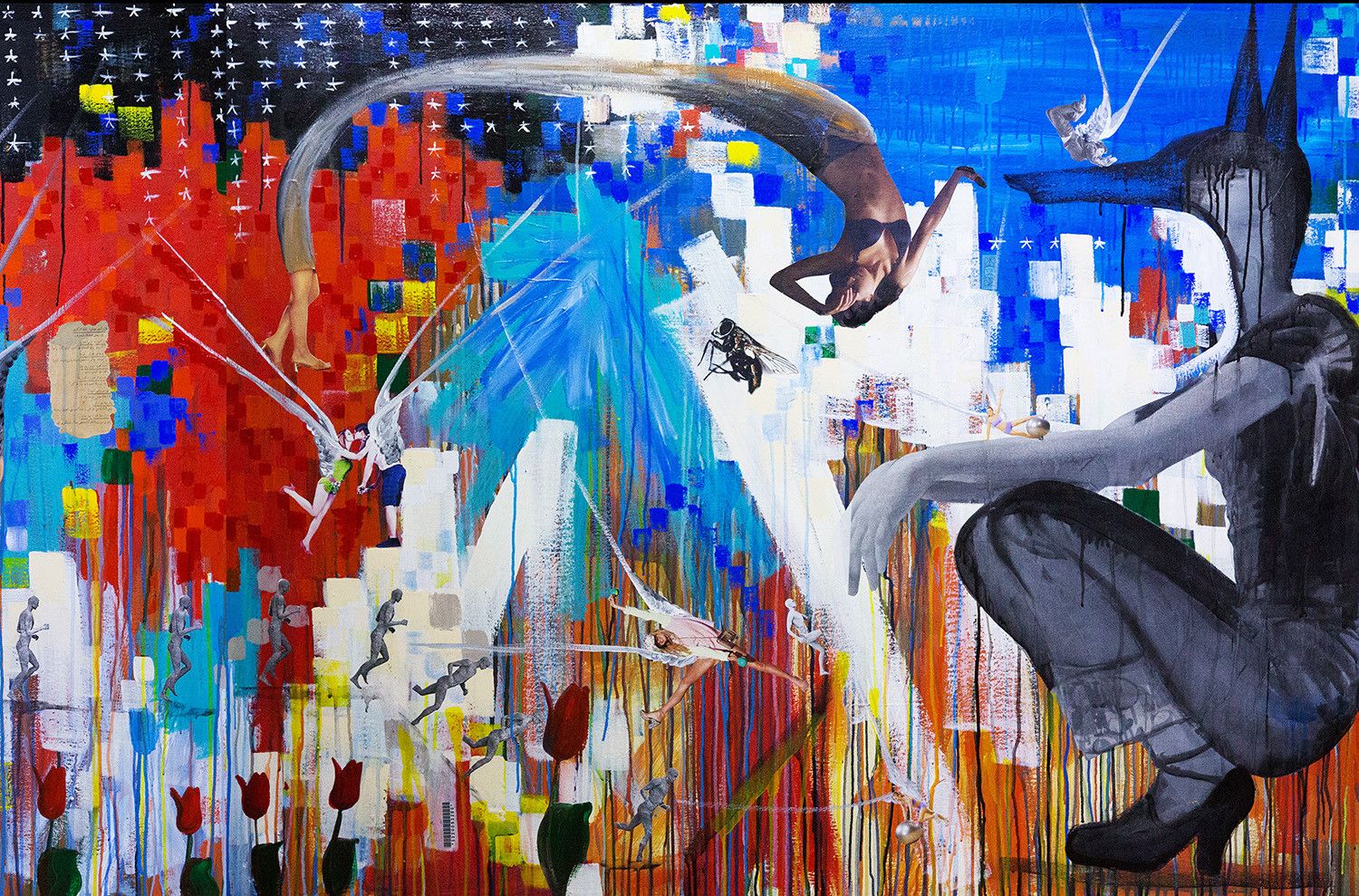The frame of mind behind anxiety is one of stubborn insistence. This is like a strong man who is absolutely determined to get his own way, or like a bull in a field which is set upon going through a break in the fence to another field. There is an agenda, and there is no budging, no letting go from this agenda. The default setting which is the ‘automatic mind’ has taken over – much to our detriment. In anxiety we hand over to this automatic mind and this automatic mind guides us unfailingly to disaster, like a faulty Sat-Nav guiding us over a cliff, or a bad financial advisor persuading us to put all our savings into a company that is doomed to fail.
This runaway mind is dead-set on obtaining the outcome that it sees as being ‘the right one,’ the one that is going to solve all our problems, and because of its mechanical nature it is incapable of reflecting upon this fixation – it is incapable of questioning it. All it can do is to keep on trying to achieve it, no matter how much grief it might be causing us in the process…
Handing over to the automatic mind in the way that we do in anxiety gives rise to a type of ‘agitated paralysis’ – an agitated paralysis which is the result of our own strength, our own will, our own determination being used against ourselves. The type of strength in anxiety is what we could call an ‘inverted strength’, therefore. It is strength that is ‘against ourselves’.
What the anxious frame of mind is insisting upon is achieving the goal of complete security or ‘absence of risk’. It cannot be put off in this any more than the strong and determined man can, or the bull in the field can. Once it gets started there is no talking to it. The mind is as we have said like a bull – it is very strong (in its own way) and in anxiety it is using all of its strength to ‘close the deal’, to achieve once and for all the (illusory) goal of maximum security. It is determined to eliminate all risk, and it will not give up the struggle until it has achieved this aim. The aim it is chasing it supposed to benefit us, but it doesn’t – pursuing this goal is actually causing us unlimited suffering. ‘Maximum security’ is the anxiogenic goal, the pain-producing goal, the pathological goal, the disastrous goal, the dark goal…
The bull of the mind cannot be swayed, it cannot be talked down, it cannot be put off. Once it has taken off in this direction it is utterly heedless. It does not respond. It just charges ahead regardless. There’s no talking to it – no matter how much pain and suffering it puts us through it cannot be prevailed upon to ‘see sense’.
What happens when we strain our hardest to achieve the goal of ‘total control’ or ‘zero risk’ or ‘maximum security’ is that irreducible conflict (or ‘lack of peace’) ensues. This irreducible inner conflict inevitably is what we call anxiety and anxiety is always the result when the bull which is the controlling mind is given its head in the ill-advised struggle to achieve total security.
The bull of the mind might be massively strong and utterly determined (or stubborn) but it can never win this fight. The bull of the mind wants to ‘refashion reality in its own way’ (in a ‘risk-free’ way) but in this task it is doomed to fail. It can never win because reality is bigger and stronger than it is, just as a charging rhino is bigger and stronger than an aphid, just as a mighty ocean liner is bigger and stronger than a toy sailing boat. Nobody wins out over reality! There is no contest, but the anxious frame of mind is too bull-headed, too obstinate in its stupidity to realize this and so it never gives up its struggle.
The bull of the mind refuses to give up until it wins, but because it can never win the result is the irreducible inner conflict known as anxiety. Anxiety is trying to win when you cannot. Anxiety is picking a fight with the wrong guy! Anxiety is trying to achieve maximum security when this is a complete and utter impossibility Anxiety is trying to eradicate all risk (or all uncertainty) even though this simply cannot be done, and even though the attempt to do so will bring us unending suffering …
Even though the bull of the mind is far too stubborn – like a machine, like an automatic mechanism, is stubborn – ever to accept that what it wants is an this impossibility there is part of us that can see it. Part of us knows very well that we are never going to win the struggle which is anxiety but we carry on struggling just the same. We carry on struggling just the same because we don’t know what else to do. We carry on struggling because we are so used to letting the bull does as it pleases.
Not only do we carry on with the futile struggle because we don’t know what else to do, and because we are so used to going along with whatever the mind wants, we carry on because the struggle has made us incapable of thinking clearly. Because we are so committed to the struggle it has ended up that all we understand is the ‘logic of the struggle’. We can’t understand anything other than ‘struggle’ – it is the only tool in our tool box and so we have to keep on using it even though it obviously doesn’t work. Control is all we understand… This is like Abraham Maslow’s ‘man whose only tool is a hammer, who sees the whole world as a nail’.
We have no other way of looking at things other than the ‘struggling’ or ‘fighting’ way – any other way of looking at things has been driven out of us by being in the struggle so long. It is as if there is no other possibility for us. As long as we have any strength left in us we will fight, even though the truth is that we are actually fighting against ourselves.
Another way of putting this is to say that any sense of perspective about what is going on has been driven out of us by the struggle. Whenever the bull of the mind is given its head and allowed to fight very hard to achieve whatever it is that it wants to achieve this drives out all perspective.
So what we have then is ‘struggling without perspective’ which is a good way of explaining what anxiety is all about. Anxiety is ‘struggling without perspective’. Or we could say, anxiety is ‘struggling for the sake of struggling’, since the fight is never going to achieve anything.
If we did have perspective then we would start to question whether constant self-destructive struggling is the best thing to do, but because we don’t the question never even arises. Because we have no perspective we never question what we are doing. Because we have no perspective we are reduced to the level of ‘the stubborn mechanism’.
With perspective we would see that if fighting to get our own way results in anxiety, then the way to end anxiety and find peace must be to give up struggling, to give up trying to impose our own impossible agenda on the situation. If trying to be the one who says what happens brings anxiety, then assenting unconditionally to the reality that is there must bring peace. There is no way that assenting to reality can’t bring peace…
Peace is something which can only really be appreciated when we have the contrast of irreducible conflict. When we have the experience of endless conflict then this experience teaches us to value peace – the merciless suffering of anxiety allows us to appreciate just how great a blessing ‘peace of mind’ really is.
Since we do appreciate what a blessing peace of mind is, why – we might wonder – would we not do whatever is necessary to find it? Why would we be so stubborn or bull-headed as to refuse doing whatever it is would bring us peace of mind? Why do we insist on hanging on to our agenda of control? Why do we insist on having the ‘solution’ to the problem only on our terms, even when these terms obviously don’t work?
The answer to this question is of course that we refuse to give up our controlling because we think that something worse is going to happen as a result of our giving it up. This is after all what our thinking is telling us. I might be having a thoroughly rotten time now but if I let go control things might get far, far worse – or so my thinking tells me. My understanding is distorted by the anxiety – I think that I am feeling so bad because of the ‘bad thing’ that is going to happen in the future if I stop controlling, not that I am feeling so very bad because of the controlling!
From the point of view of the thinking, calculating mind that ‘letting go’ is a huge risk and risk is the one thing the anxious mind does not like. The anxious mind set is fundamentally opposed to risk, just as a devout Muslim would be opposed to eating a meal of roast pork, just as a committed vegetarian is opposed to eating a donner kebab.
But as we have said there is always a part of us that is not totally under the sway of the anxious mind set and that part of us can see that we are already going through hell, so what ‘additional hell’ is it that we are so afraid of happening? What after all could be worse than going through the suffering of endless pointless fruitless conflict – without any possibility of relief just so long as we keep on stubbornly struggling? How could anything be worse than this?
When we get to the point when we can see this, and are willing as a result to take the risk of letting go, then we do have the possibility of finding peace. When we see that it is not what we are fighting against that is the problem but, but the fact that we are fighting then this is the crucial insight. The grip that the thinking mind has on me is significantly weakened at this point. If ‘insisting on having my own way no matter what’ is the infallible recipe for never-ending strive and turmoil, then the exact opposite attitude of ‘assenting unconditionally to whatever will happen’ is the infallible recipe for peace. How could it not be, when it was only my insistence of controlling that was perpetuating the state of ongoing conflict?
At the root of my refusal to relinquish control lies a fundamental lack of trust in reality. But if I don’t put my trust in reality (or life’ or ‘the universe’, or whatever we want to call it) where will I put it? What else is there? Why is it that I have made reality into the enemy to be fought against to the bitter end? Why is it that I always throw my lot in with the heedless bull of the mind, even though it has proved itself to be ‘an unfailing source of suffering’ every time? The heedless bull of the mind, driven as it is by nothing more than fear, is the ‘unhelpful friend’ who always gives us bad advice…
Anxiety is created by the controlling mind and it is the fruit of that mind, just as a pear is the fruit of a pear tree, or a banana is the fruit of a banana tree. Anxiety cannot be separated from the controlling mind, no matter how much effort we put into it! There is no way controlling can eradicate anxiety, any more than fighting can eradicate war.
On the other hand, there is no way that relinquishing control – by assenting unconditionally to the reality of whatever is going to happen – cannot result in peace. Assenting unconditionally to ‘what is’ always results in peace, just as fighting against ‘what is’ always results in conflict and strive. Assenting unconditionally is peace, just as controlling is conflict!
Whilst it is of course true that assenting (or ‘accepting) is very difficult to do in the sense that we are so used to taking the opposite attitude, we can practice it, just for a limited period of time each day. We can practice ‘letting go’ instead of ‘holding on’! In order to practice letting go all I need to do is give my permission – for perhaps ten minutes – for ‘things to be as they actually are’ for that time, and then when the time is over I can carry on with my everyday life. The only thing is, this permission-giving cannot be mere ‘lip-service’ – it has to be sincere, it has to be something that I really mean. It has to come from my heart, not from my thinking mind. This cannot be rushed therefore – it can only happen when it is ready to happen. I can create the space for it to happen, but it happens in its own time.
When I give permission for ‘things to be as they actually are’ I can’t just be doing this as a ploy, as a strategy – that would just be me ‘playing clever’! That would just be me ‘trying to wangle it’. That would just be me ‘looking for an angle to play’. Assenting to reality is something we don’t do ‘for a reason’, or because ‘someone has suggested that we should’, but because it makes sense to us in a very deep way to do so.
What we are talking about here has nothing to do with strategizing or cleverness therefore – it is a very deep assenting to reality being the way that it actually is. It is a ‘rediscovery of trust’. This is a profoundly sane act (if we can call it an act, which it isn’t in the usual sense of the word). It is – we might say – a spontaneous act rather than a purposeful or intentional one. To assent in a deep and unconditional way to reality ‘being what it is’ is the epitome of wisdom and sanity – this alone is the doorway to happiness and peace of mind. There is no other doorway to happiness and peace of mind – certainly we can’t find it through ‘successful controlling’!
Spending ten minutes a day (or more if we wish) practicing letting go might seem to be a pretty insignificant gesture but if I make a discipline of doing this the practice will slowly but surely start to ‘take root’, so to speak. Letting go will become part of my life, and I will find that I am able to willingly relinquish control and ‘let things be as they are’ more and more in everyday settings.
If I practice this exercise (or any other mindfulness exercise) every day (just as I might go for a walk every day, or brush my teeth every day) the understanding that it is OK (in fact more than just OK!) to ‘let go’ and trust things to be exactly the way that they are penetrates deep and it starts to become a real possibility in my everyday life. I start to learn that controlling isn’t the only response to difficulty. I learn that I don’t have to turn life into a battlefield!
‘Not controlling’ then becomes a possibility that I have in my everyday life, and I find that I am practicing ‘letting go’ more and more often, with benefits that become more and more obvious. It becomes more and more natural to me, until it becomes as natural as breathing…
This represents a ‘one hundred and eighty degree turn’ with regards to our attitude to life. It is as Krishnamurti says ‘a revolution’. It is as Krishnamurti says the ONLY revolution. After all, the controlling mind’s way is to never let go, not even for a second – it doesn’t understand ‘letting go’ at all – and so spending ten minutes every day consciously letting go, or consciously ‘handing over control’ is a very significant change.
It may not seem like much on the face of it therefore, but practicing ‘letting go’ by assenting to reality being the way that it is even just for ten minutes a day is all that is needed – in time – to tame the runaway bull of the controlling mind.






